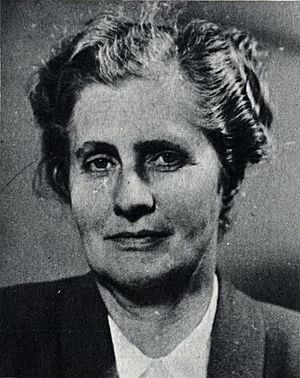Dakky Kiær facts for kids
Quick facts for kids
Dagny Caroline Kiær
|
|
|---|---|

Dakky Kiær
|
|
| 14th President of the Norwegian Association for Women's Rights | |
| In office 1946–1952 |
|
| Preceded by | Margarete Bonnevie |
| Succeeded by | Ingerid Gjøstein Resi |
| Personal details | |
| Born | 19 August 1892 |
| Died | 21 July 1980 |
| Nationality | Norway |
| Political party | Liberal Party |
Dagny Caroline "Dakky" Kiær (born August 19, 1892 – died July 21, 1980) was an important Norwegian politician, a strong supporter of women's rights, and a community leader. She worked for the Liberal Party and helped make many positive changes in Norway.
Contents
Who Was Dakky Kiær?
Dakky Kiær was born in a place called Aker, near Oslo. Her father, Georg Fredrik Egidius Kiær, was a lawyer and even a mayor. Her mother was Julie Caroline Helene Løvenskiold. Dakky came from a well-known family. Her grandfather, Herman Severin Løvenskiold, held a special position in the Royal Court called the Lord Chamberlain. This meant he managed the royal household. Dakky also had a brother named Thorry Kiær, who became an important person in industry.
Working for Women's Rights
Dakky Kiær was a true pioneer for women's rights in Norway. She believed that women should have equal opportunities and be treated fairly.
Leading Women's Organizations
From 1946 to 1953, Dakky was in charge of a special school called Norske Kvinners Nasjonalråds sosialskole. This school helped train women for social work. It was a big step in helping women get professional jobs.
Even more importantly, from 1946 to 1952, Dakky Kiær was the President of the Norwegian Association for Women's Rights. This organization works to improve the lives of women and ensure they have the same rights as men. As president, she played a key role in fighting for equality.
Her Political Career
Dakky Kiær was not just an activist; she was also a politician. She wanted to make changes from within the government.
Serving in Oslo City Council
From 1952 to 1956, Dakky was a member of the city council in Oslo, the capital of Norway. She represented the Liberal Party. In this role, she helped make decisions about how the city was run, from schools to public services.
Running for Parliament
Dakky also tried to become a member of the Norwegian Parliament. In the 1949 parliamentary election, she was almost elected. She was the next person in line if someone from her party couldn't serve. She also ran in the 1953 and 1957 elections, showing her dedication to public service.
Later Life
Dakky Kiær continued to be an active and respected figure. She passed away in July 1980 in Oslo, leaving behind a legacy of hard work for women's rights and a better society.
 | Sharif Bey |
 | Hale Woodruff |
 | Richmond Barthé |
 | Purvis Young |

